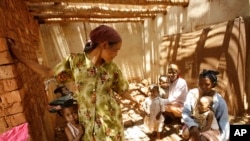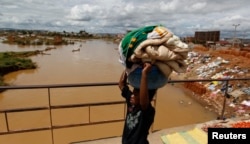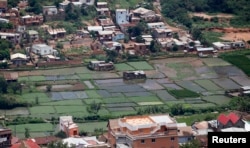Aid officials say severe food shortages are sweeping southern Africa, affecting 27 million people in the region.
But in this big swath of Africa, one afflicted country stands apart, Madagascar. Like other southern African nations, the Indian Ocean island is reporting severe food insecurity, mostly due to bad weather that has destroyed or impaired harvests.
But this island nation off Africa’s east coast is known for being different.
“Indeed, Madagascar, if you could define it in one word, that would be the word ‘different,’” the World Food Program’s Madagascar country director, Willem Van Milink, told VOA News during a recent sit-down in Johannesburg. He says this uniqueness should drive the response to Madagascar’s food shortages.
Madagascar is asking donors for just more than $10 million. In all, about one million citizens are food insecure, 400,000 of them, severely so.
Rich, but poor: Madagascar's origins
Madagascar is often called the “eighth continent” for its uniqueness and great biodiversity. It has a global monopoly on the lemur species, with 96 types of the small, impossibly cute tree-dwelling primates that look something like a monkey crossed with a cat crossed with a squirrel.
The island is also home to the majority of the world’s vanilla supply, stunning beaches and a population with diverse roots extending from Indonesia to the Middle East and France.
But despite these riches, it is desperately poor. Political crises batter the nation approximately every decade, causing economic declines and scaring off investors. An average of one and a half cyclones also batter the island every year, creating havoc among a population that is already poor and desperate.
This leaves many of Madagascar’s people forced to turn to the land for sustenance, which has in turn led to a deforestation rate of 85 percent.
Van Milink says after decades of this downward spiral, in recent years some desperate people have even started eating lemurs.
Diverse approach to food insecurity
That’s why, Van Milink says, this $10 million, which will be spent on emergency response and school feeding programs, is only part of the diverse solution Madagascar needs.
“There is many, many areas in which we have to work,” he said. “I think governance is a priority area, but of course also working with the farmers so that they have other alternatives ... Or helping people also to get access to good nutrition and not having to eat other types of animals, even lemurs, for example. Those types of interventions, I would say, at different levels.”
He says improving governance should be a priority. Madagascar’s 2009 coup took more than four years to resolve. In the meantime, instability, sanctions and aid restrictions further hurt the nation.
“The economic situation has deteriorated even much more in those periods,” he said. “In the last one, which was a very long transition period that went from from 2009 up to the end, 2013, December 2013 when the elections took place, the country was actually with no means to face all types of problems.”
This has led, he says, to long-term problems. Prolonged malnutrition leads to stunting among children, which is also tied to learning difficulties. And the incessant pressure has left the Malagasy people with few coping mechanisms.
“It’s clear that all of these political problems are in the past years, and bad governance and coupled with also other types of disaster, every year, a couple of cyclones, every year, drought, and very low capacity to build resilience with populations, has been a main factor,” he said.








